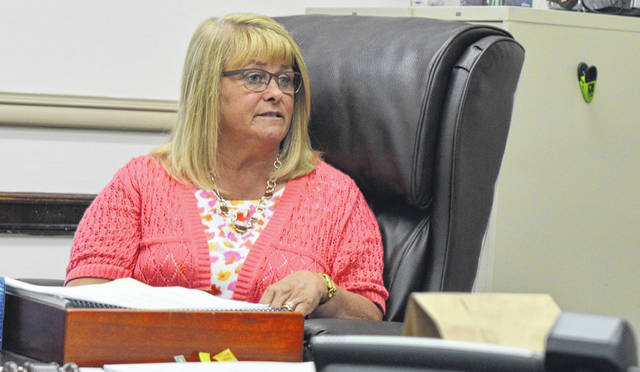
WILMINGTON — Commissioners had a lively discussion regarding a planned advisory board that — once a charitable fund is created — will review requests for money linked to the county’s 2009 sale of Clinton Memorial Hospital.
Clinton County Commissioner Brenda Woods suggests that county commissioners not necessarily occupy three seats on a five-person advisory board, whereas Clinton County Commissioner Patrick Haley strongly favors board membership having that makeup.
Woods gave several reasons for wanting commissioners’ participation on the advisory board to be optional. For one, she’s concerned the commissioners’ involvement could open the door to possibly politicizing the grant-awarding process — “making decisions for political outcomes or favors,” she said.
She doesn’t want the grant-selection process to become a political issue in the years to come, Woods added.
But Haley said he feels the commissioners have a “fiduciary” relationship to the money because it is taxpayers’ money.
Haley said he feels “very, very strongly” that the three commissioners need to “have control” within the advisory board. Members of non-governmental boards can have their own special-interest agendas, he said, whereas commissioners at least are accountable to the voter and the taxpayer.
Similarly, Clinton County Commissioner Kerry Steed said he likes the idea of all three commissioners sitting on the advisory board, “especially with the amount of money that can be put in there.” He said he understands Haley’s argument that board members should be accountable to the general public, adding he wouldn’t want a board that did not have direct accountability to voters.
Sometimes, one person on such a board will “drive the group,” said Steed.
Clinton County Engineer Jeff Linkous was at this week’s discussion, and upon hearing Haley’s and Steed’s preferences for commissioners holding the majority of the seats, asked why then would commissioners need the two other people on the board?
Woods said she has heard the same question from the public.
Haley responded he doesn’t think the two non-commissioners are needed for the board, but he goes along with it as a compromise, repeating his basic position that commissioners are responsible for the money and so they should make the decisions.
He reiterated that when it comes to politics, “Many of these [non-governmental] boards have more politics than commissioners.” Often the projects of these boards take care of friends, he said.
Steed, though, offered support for having some non-commissioners on the advisory board in order to bring into the deliberations different perspectives and people from different parts of the county.
Haley said the “safeguards” put into place now will be so important for the future of the fund and the grants awarded.
Linkous said having three commissioners on the advisory board would “drive” the discussions concerning the grant awards, and asked why not have a five-member advisory board — none of whom are commissioners — make recommendations to the commissioners who would have the final say-so?
Haley said such a board would be unnecessary and “just a complication.” Previously, there have been different boards that tell commissioners what they should do, added Haley.
Woods then said, “We definitely have enough individuals in the county that are of the mindset of protecting taxpayer dollars, knowing the community and knowing needs.”
On a second issue, commissioners discussed how to protect the principal in the fund and yet still leave open a possibility in extraordinary situations of dipping into the principal for a larger project. Because commissioners want the fund to last decades, they’ve said it would be the interest income that’s generated by the principal that would be awarded as grants.
If dollars do get pulled from the principal, it should be required that the Board of County Commissioners as its own entity approve the action, said Steed.
Steed said the advisory board could easily be lobbied, and the board members’ votes could be unduly influenced because at least some members would not be accountable to the voters, and not used to tough decisions and not wanting to say no to requests.
Haley followed up by saying if an advisory board were put together without commissioner oversight, “… we would have a YMCA building already started that was not going to be successful.”
Haley wondered whether an advisory board unanswerable to the voters could have withstood the “fire” that the then-commissioners received in respect to a YMCA request for a new facility made to commissioners in November 2013.
Haley said the Board of Commissioners at the time went through six months to a year of “letters from kids at the Y.” Moreover, some of the best friends he had no longer speak to him because commissioners did not decide to disburse money to the YMCA, he said.
Commissioners are expected to entrust at least $2.9 million of what’s popularly called “hospital money” to the not-for-profit Clinton County Foundation, pending the drafting of a transfer agreement.
The Clinton County Foundation can more aggressively seek interest income than the county, commissioners have said.
Steed said Wednesday if about $3 million is transferred initially to the Clinton County Foundation, about $160,000 to $180,000 would be generated annually for grant awards.
When all the proceeds from the hospital sale are received after a few more deferred annual payments to the county, there will be millions more available for the fund.
The topic is expected to be revisited on Monday during the commissioners next regular meeting.
First-term Commissioner Woods started her discussion this week by apologizing for taking about 19 months to provide the other commissioners her ideas on the creation of an endowment fund. She said she met with individuals and spoke by phone with others to get their thoughts on the question.
She feels the matter is one of the most important to be dealt with in the tenures of the current commissioners. Commissioners President Haley said he appreciated her being thorough.


